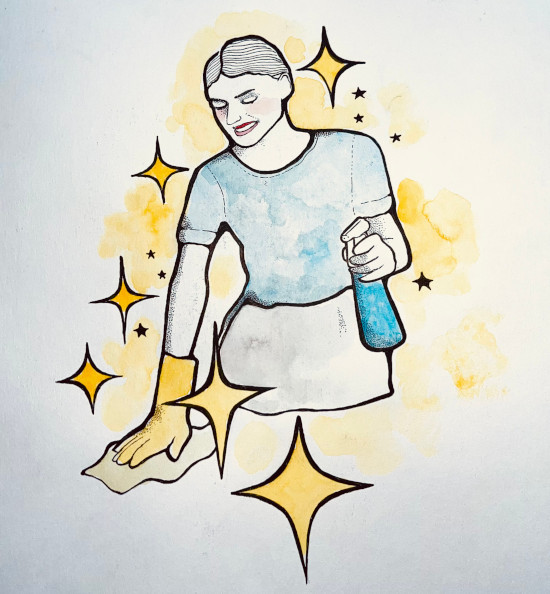Cleaning with care
The joys of tidying

Illustration by Gabrielle Funk
The process of cleaning has always been an integral part of my life. Many of my earliest memories are shaped by the scents, sights, sounds and sensations of cleaning. I can vividly recall the feeling of my mother’s cloth-brandished hand reaching from behind me to wipe my perpetually snot-covered face – an act I vehemently rejected.
My mother was a diligent cleaner. Coming from a family of tireless tidiers, every speck and every streak was an affront to her being. She spent countless hours making sure that everything was in order, that no cabinet was contaminated and that no rug remained unvacuumed.
Her disposition was likely an inherited cultural sense of status. To her, a clean home was a successful home, and the practice of hygiene and maintenance were ways to project one’s internal value. If both bodies and objects were kept in pristine form, it could demonstrate, for those looking in, that they were of exceptional worth.
Like many teens, I downplayed the necessity of cleanliness. I saw it as a bourgeois practice, a product of suburbanization and the middle-class accumulation and defense of unnecessary “stuff.” And for the stuff that I deemed necessary, such as my bed or clothes, cleanliness was an unnecessary illusion that masks the ugly realities of wear.
“Things are meant to be used. They are meant to be dirtied. Why should I try to hide that?” I would retort, in an expectantly spoiled fashion, any time I was asked to simply clean up after myself.
It was only as I grew older, and got a job as a janitor, that I began to see the value in preservation through cleaning. Working in schools across the city, I mopped floors, disinfected tables and scrubbed toilets.
Through this process, I saw how the act of cleaning was an act of care. I felt immense pride knowing that I was nurturing and defending objects so that others around me could use them. My acts helped extend their lifespans and allowed more people to use and rely on them daily.
In a capitalist society, where extracting value is of the utmost importance, the actions of those in the caring economy – like cleaners, homecare workers and daycare staff – are often radical. Care entails a maintenance of value and a use of time and energy to safeguard what is already here rather than producing more.
As an adult, I have grown into my inheritance: a compulsion towards constant cleanliness. But, with my own home with its associated nooks and crannies, it seems so much easier for dirt and grime to collect on every surface. Every time I scrub or scour, some additional form of disorder creeps up on me, leaving behind piles of dust and colonies of smudges.
Still, the process must be done, and I have begun to feel an immense joy in the unending practice of care through cleaning.
As I smell the acerbic waft of industrial solutions as they leave the spray bottle, I am transported back to my mother's diligent practice of care.
Although I struggled to see how scrubbing my face was a way of showing love, I see now that those actions were ways of caring for me and showing me my inherent value.
Patrick Harney is the comments editor at The Uniter. He still doesn’t make his bed every single day.
Published in Volume 78, Number 14 of The Uniter (January 18, 2024)







